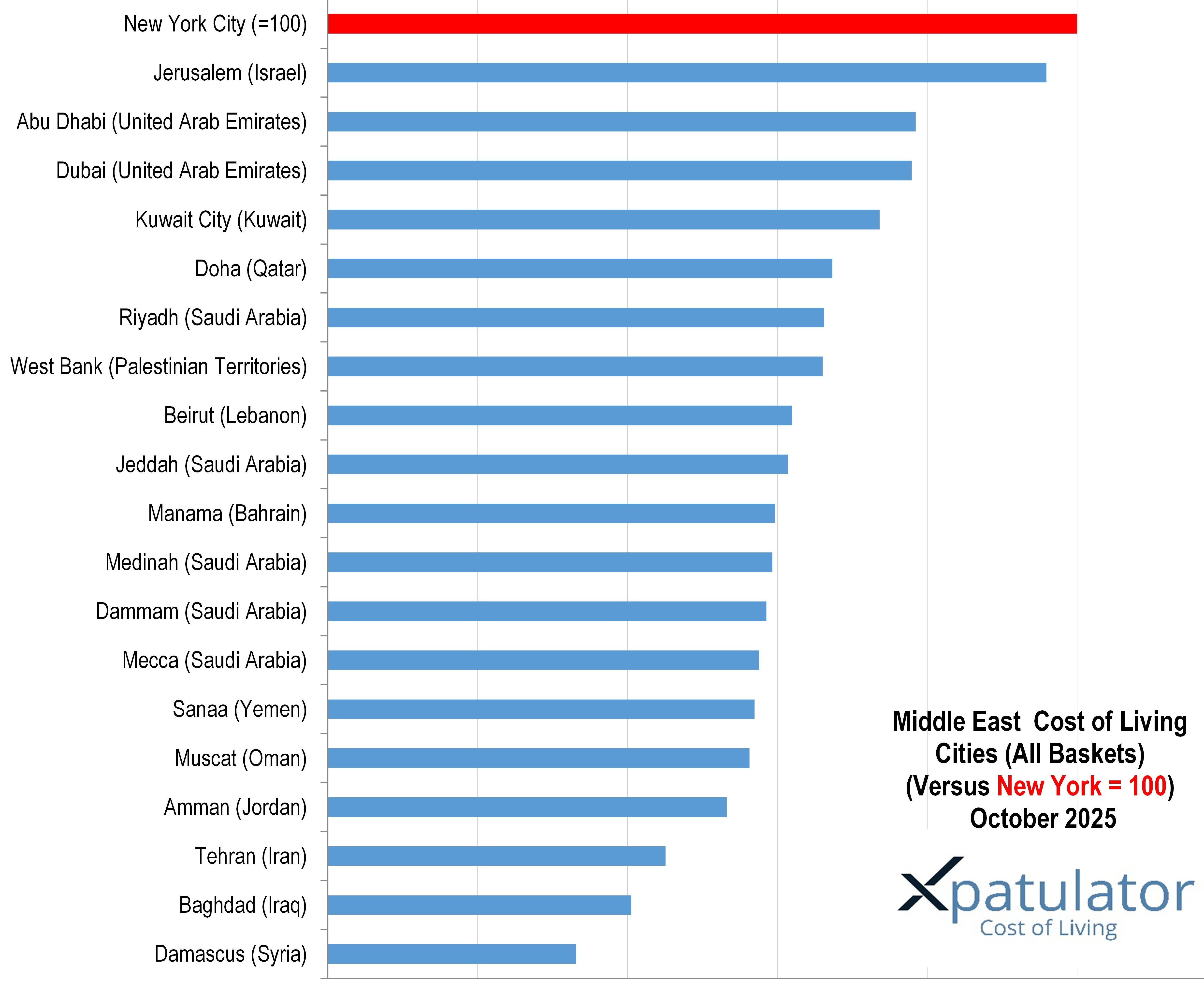
Cost of Living in the Middle East 2025: Expat Guide to the Region’s Most Expensive and Safest Cities
2025-10-01
The Middle East in October 2025 presents a starkly varied landscape for expatriates, with cost of living indices ranging from the near-New York levels of Jerusalem to the conflict-ravaged affordability of Sanaa and Damascus. Gulf powerhouses like Abu Dhabi, Dubai, and Doha dominate the top of the rankings, offering relative safety and world-class infrastructure at a steep price, while other cities are less costly but carry significant risks, from political instability to outright war. For expats, the choice is less about price alone and more a complex calculation of security, lifestyle, and personal resilience—a region where both opportunity and danger exist in sharp relief.
Expatriate Cost of Living in the Middle East
The Middle East, so often painted in broad brushstrokes by external observers, reveals a remarkable spectrum of experiences for expatriates—ranging from gilded affluence in the Gulf to the battered resilience of cities on the frontlines of conflict. The latest Xpatulator cost of living survey, which benchmarks 780 global cities using New York City (index: 100) as a reference point, lays bare not just the financial demands of living in the region, but also the shifting geopolitics and realities of daily life for the international community.
Jerusalem
Topping the regional chart is Jerusalem (Index: 95.9), outstripping its regional rivals and approaching parity with global financial centres. Israel’s complex security situation, ongoing conflict, and frequent import dependency drive up prices, particularly in accommodation and goods. Jerusalem’s cost of living profile is compounded by a relatively high wage floor, robust demand in the services sector, and heavy regulation—factors which, together with chronic supply chain interruptions, make it the region’s least affordable city for expatriates. While security infrastructure is world-class, the omnipresent threat of violence and geopolitical volatility cannot be understated, making it both costly and, frankly, mentally taxing for foreign workers.

The Gulf States—long the byword for tax-free opulence—predictably dominate the next tier. Abu Dhabi (78.5) and Dubai (77.9) lead the United Arab Emirates’ charge, at the top of the Middle East cost of living rankings. Here, housing remains the principal driver of high living costs, with both cities notorious for their spiralling rents, luxury lifestyles, and import-reliant retail sectors. Utilities, schooling, and healthcare—frequently bundled with employment packages—add further heft to the expat bill. That said, the personal safety quotient in the Gulf is, by global standards, exemplary; violent crime is minimal, infrastructure is modern, and daily life operates at a level of efficiency that would shame many Western capitals.
Kuwait City (73.7), Doha (67.3), and Riyadh (66.2) round out the region’s costlier destinations. Qatar’s capital, in particular, continues to ride the wave of World Cup-driven infrastructure and construction booms, which, while creating opportunities, have also pushed up prices for accommodation and private schooling.
Saudi Arabia
Riyadh (66.2)—the nerve centre of Saudi Arabia’s Vision 2030 project—sits in the middle of the region's cost of living table, its transformation into a megacity not yet matched by the price inflation seen in the Emirates. Jeddah (61.4), Medinah (59.3), Dammam (58.6), and Mecca (57.6) though significant religious and commercial hubs, remain somewhat more affordable, a reflection of slower internationalisation and broader availability of domestic goods and services.
Beirut (62), Muscat (56.3) and Amman (53.3) stand as case studies in Levantine resilience. Lebanon’s ongoing economic meltdown means the cost of imported goods is astronomical—indeed, often simply unavailable. For the rare expat prepared to weather Beirut’s daily privations (rolling blackouts, currency collapse, and political chaos), the “official” cost of living figure feels almost academic: safety and stability are the real premiums, and both are sorely lacking. Muscat and Amman, by contrast, are stable and affordable.
Manama (59.7), capital of Bahrain, delivers a taste of Gulf luxury at a fractionally lower cost, but with a less robust infrastructure and ongoing, if sporadic, civil unrest.
Where Not to Go
For the risk-averse, cities like Sanaa, Damascus, Baghdad, and large swathes of the West Bank should be strictly avoided. They are zones of active or latent conflict, with poor medical services, patchy infrastructure, and unpredictable security situations. No employer can reasonably guarantee safety here. Even Beirut, for all its cultural allure, is currently a dicey proposition unless one is well insulated by diplomatic or corporate resources.
It is in the lower reaches of the index that the realities of the region’s political and security crises become most pronounced. Sanaa (Yemen, 57), Baghdad (Iraq, 40.5), Damascus (Syria, 33.1), and the West Bank (66.1) are cheap for a reason: they are functionally inaccessible or actively dangerous for most expatriates. Conflict, sanctions, currency collapses, and the virtual absence of reliable services ensure that, while the cost of living may be low on paper, the real cost—measured in risk and stress—is immeasurable.
Tehran (45.1), too, suffers from international sanctions and economic isolation. While basic goods are subsidised, expats encounter extraordinary bureaucratic hurdles, banking headaches, and the unpredictability of political turbulence.
The Verdict: Calculated Choices in a Complex Region
For expats seeking both safety and comfort, the Gulf cities—Abu Dhabi, Dubai, Doha, Muscat—remain the clear choices, at a reasonable level of cost of living. Jerusalem offers a cosmopolitan, if fraught, experience; but the high price tag is matched by high risks and relentless complexity. Everywhere else, “cost” ceases to be just a number; it becomes a calculation of risk, resilience, and one’s appetite for uncertainty.
In summary, the Middle East in 2025 is a region of extremes, both in cost and in lived reality. Expatriates would do well to weigh not just the numbers, but the daily realities, before committing to a posting here. As ever, in this most mercurial of regions, fortune favours not so much the bold as the well-informed.
Use Xpatulator’s Cost of Living Calculators and Tools for informed decision-making about the cost of living and the salary / allowance / assignment package required to maintain the current standard of living.